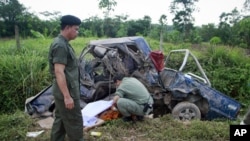A roadside bomb attack in southern Thailand’s restive Yala province killed at least two Buddhist monks early Monday. The region has been the site of an ongoing insurgency since 2004 that has killed thousands of people. The violence has only increased in recent months. As Thailand prepares for a tightly-contested national election in July, politicians are considering options that are aimed both at calming tensions and winning votes.
The southern provinces of Pattani, Narathiwat, Songkhla and Yala are the focus of a separatist insurgency that since 2004 has killed more than 4,600 people.
In recent months militant attacks have grown more brazen, with car bombings on military bases and outposts and shootings targeting state officials. Thailand’s military and civilian governments have struggled to deal with the violence, despite deploying more counterinsurgency forces and tightening security.
Imtiyaz Yusuf, a professor of Islamic studies and religion at Assumption University, says the violence has led to fresh calls for a political solution in the region. “It is a general discussion that is going on in the Thai political community that the only option to address the problems in the South is to take measures towards self governance. It will be like a valve to release lots of frustrations and demands which are going on in the South. It will help, but not in the long run,” said Yusuf.
While Thailand’s population is largely Buddhist, the residents of these provinces are mostly Muslim Malays who feel they have been ignored by the central government in Bangkok. The southern insurgent groups have never identified themselves, nor their objectives. However, they usually target people viewed as symbols of the Thai Buddhist state or their collaborators.
The region remains under emergency rule with more than 30,000 troops, some 20,000 territorial light infantry and police forces stationed across the four provinces. Critics have accused the military of using heavy-handed tactics against locals.
But with elections scheduled for July 3rd, both the governing Democrat Party and opposition Puea Thai Party hope to lure voter support in the region.
Prime Minister Abhisit Vejjajiva, the Democrat Party leader, last week set out policies promoting special development zones. But Panitan Wattanayagorn, the government spokesman, says those reforms rule out regional autonomy.
“There are various study groups working on these issues along the way of creating a special zone specifically for the needs of the locals based on the current constitution. The constitution doesn’t allow the separation of the areas in such a way that reduces the sovereignty or the unity of the country,” stated Wattanayagorn.
In a bid to win votes in a region historically dominated by the Democrats, the opposition Puea Thai Party has favored a form of decentralization, but not the complete autonomy called for by insurgent groups. Kudeb Saikrajang is a Puea Thai Party supporter and former party spokesman.
“We believe in the kind of autonomous entity for the provinces to work that way. But it doesn’t mean to have to be absolute authority to run the province. We may have more decentralization for the people there. And I think it’s the model for the South. I believe that a policy remains, remains with the party,” said Saikrajang.
The Thai military resists moves by the government for greater civilian control in the region which remains under emergency rule. Analysts say the Thai military fears any moves to autonomy would boost insurgency demands for complete independence from the Thai state.
Thai Election Season Brings New Push to Address Violence in South




